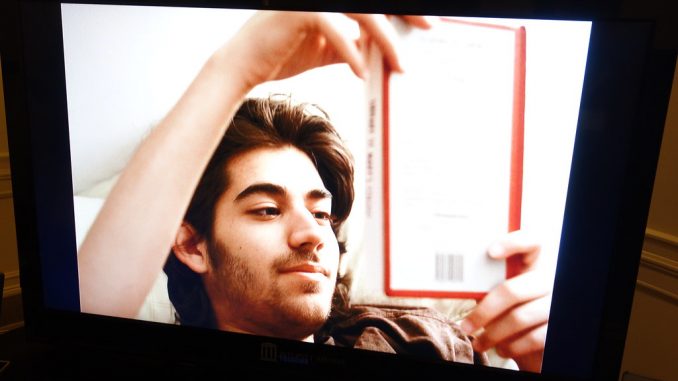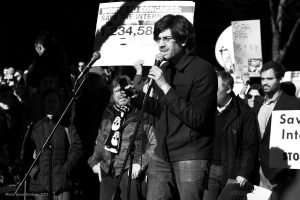
“Photos of Aaron Swartz at memorial at Internet Archive in San Francisco” by Steve Rhodes is licensed under CC BY-NC-ND 2.0
The beginning of the film throws a question to the audience by quoting Thoreau’s words
‘Unjust laws exist; shall we be content to obey them, or shall we endeavor to amend them, and obey them until we have succeeded, or shall we transgress them at once?’
This is what Aaron Swartz has always been thinking about. The film The Internet’s Own Boy: The Story of Aaron Swartz looks back on Aaron Swartz’s life through interviews with Aaron’s family and close friends around.
Access to the Internet
Starting with the creation of The Inf, a website like today’s Wikipedia at the age of 12, and then he was involved in building Creative Commons, which allows creators to mark their creative works with a degree of freedom, setting a more flexible ‘some rights reserved’ between the traditional ‘all rights reserved’ of copyright and the ‘no rights reserved’ of the public domain. Aaron demonstrates his pursuit of intellectual freedom as well as his concern for copyright. The nature of the Internet is that it is open and public, but that does not mean that everyone in the world has access to the Internet. First, there are regional disparities in Internet coverage. In Australia alone, as of September 2021, nearly 90% of the population has access to the Internet. In terms of the world, there are still many third world countries with very low internet penetration. (Hinton,2021) It also reproduces the power gap to some extent. Qiu (2009) mentions that the working class, due to limited access to devices, many never use search engines to access information.
Second, users need to access the Web through specific local servers that reflect regional market systems or national regulatory regimes. (Abbate,2017) In China, for example, “firewalls” are set up to block and filter some foreign sites and programs, so you cannot access sites like Google from Chinese servers (Freivogel,2011).In addition, access to the Internet is limited by language, physical ability, social environment. (Abbate,2017) The Internet is presented differently to different people. If even universal access to the Internet is not available to everyone, doesn’t it make things even harder to put chains on knowledge and pay high “threshold fees” to access it? The film conveys Aaron’s strong opposition to such practices, and Aaron has devoted much of his energy to public access projects, helping Carl Malamud fight against Pacer (Public Access to Court Electronic Records), a system that includes legal cases. Although the cases themselves are public records, it costs 10 cents to read a page of legal information on Pacer. And everyone may need to use Pacer, people who do not have money to read the law will become very difficult. What Aaron did was to write code for massive automated parallel downloading from 17 libraries that had free access to Pacer’s resources, eventually obtaining nearly 2.7 million copies of Federal Court documents, which further forced the courts to change their policies.
Aaron vs JSTOR
Aaron has always believed in sharing information and freedom of knowledge. He says, ‘Sharing is not immoral, it’s a moral imperative.’ Tim Bernere-Lee was a big influence on Aaron, creating the World Wide Web and then making it free rather than for personal gain. It’s hard to imagine what the Internet would look like today if he hadn’t shared it for free. At the age of 24, Aaron wrote a Python script that downloaded more than four million scholarly journal articles from JSTOR, an online scholarly database, through MIT. In Aaron’s view, it was unreasonable for these scholarly journal articles to be locked up and made available to a limited number of people for a fee, not only because they had been paid for or subsidized, but also because they were the public wealth of knowledge that belonged to humanity. But the FBI saw it differently, and prosecutors saw it as theft and a provocation to online censorship. Apparently, they were aware of the threat Aaron posed.
From a historical point of view, capitalists have always been at the center of social culture, and Aaron’s actions subvert the ideology of privatization that underlies the capitalist system of cultural production and dissemination on two levels. The first is the impact that Aaron’s final step, opening scholarly articles to the public, will have on companies like JSTOR, which will lose how it has continued to privatize public resources for private gain in the name of copyright protection. Secondly, Aaron’s belief in the non-private interest, and his desire to bring information to public domain directly negates the concept of the rational economic man (i.e., people are rational, and individual interests come first) presupposed by the capitalist system of production and the system of private property rights. This conveys to the society a concept of freedom that is different from capitalism, that is, information and knowledge should be freely available to all. This is dangerous for the government in a capitalist system, as is evident the fact that the Electronic Crimes Task Forces, created by President Bush Junior’s signing of the USA PATRIOT Act after 9/11, took over Aaron’s case. Aaron had apparently been defined as a terrorist, and prosecutors wanted to make an example out of him for deterrence.

“Aaron Swartz” by Maria Jesus V is licensed under CC BY 2.0
The conflict of Copyright in the Internet context
The concept of copyright has become confusing in the Internet world. Respecting copyright is the consensus, but how to protect the rights of creators is something that needs to be carefully and seriously discussed. Aaron’s actions in the film offer a new way of thinking about copyright. According to Abbate (2017), the Internet is defined by situation, position, and issue of the day, and can be defined by historians as well as by politicians to serve political needs. I believe the same argument can be used to understand copyright protection in the Internet context. One example is the opposition to SOPA (Stop Online Piracy Act) led by Aaron. SOPA’s bill is so broadly worded that if passed, it would give the U.S. Department of Justice more power over Internet censorship and further legitimize surveillance of Internet users. On the one hand, SOPA puts every website operator at risk of having their entire website shut down without trial for a single violation. (Quoting Aaron). On the other hand, SOPA is destructive to the speech and civil liberties of online citizens, and this destruction of the framework and open and inclusive nature of the Internet ‘in the name of fighting piracy’ makes no sense. (Quoting Sen. Ron Wyden (D)). Furthermore, SOPA is not conducive to the circulation and distribution of creators’ works. The pass of SOPA will satisfy no one but the government and the capital behind it, and perhaps some copyright holders. According to Suzor (2019), an effective approach to copyright protection will inevitably require ‘technology companies and internet intermediaries’, as they are the only ones with the ability to influence large-scale users through the policymaking of websites. However, the individual rights and public interest of the remaining billions of Internet users are ignored when copyright owners and technology companies reach agreement that serves their respective interests. The democracy and fairness of the Internet is also undermined.
Conclusion
The film emphasizes Aaron’s positive image and does not overly select Aaron’s antagonists – the FBI, prosecutors, and anti-hacking groups – to comment on Aaron. This may not be a comprehensive portrayal of Aaron, but it is not necessarily unobjective. Looking back on his life, from founding The Info, building tools like RSS to aggregate content from multiple web pages and perfecting CC for online copyright, to defying Pacer and leading the successful fight against SOPA, and even then, to the lawsuit against JSTOR, he did not act out of self-interest or to hurt anyone. As a proponent of activism on the Internet, he lives by the democratic idea that information and knowledge should be shared and circulated freely throughout society. During this struggle, it is important to reflect on the misuse of law enforcement resources by the judicial system. Was Aaron Swartz’s sentence appropriate? Is it normal to use the state apparatus to punish and respond to everything that causes panic and anger in the government?The director of the film is partial to and admires Aaron Swartz, as evidenced by the title ‘The Internet’s Own Boy’. But having preconceived notions does not diminish the objectivity of the film. By telling Aaron’s story, the film triggers the debate about online copyright and online access to information, and raises awareness of how power and institutions have an impact on the Internet environment.

Image via The Internet’s Own Boy: The Story of Aaron Swartz
In 2013, Aaron faced up to 13 felony charges and possiblely up to 35 years in prison from US federal prosecutors and committed suicide in his New York apartment. Aaron’s suicide reminds me of his Guerilla Open Access Manifesto
‘ There is no justice in following unjust laws. It’s time to come into the light and, in the grand tradition of civil disobedience, declare our opposition to this private theft of public culture.’
I guess this is Aaron’s answer to the question at the beginning of the film. What Aaron Swartz left behind is the spirit of Internet freedom and democracy and the hope for a better Internet and the world.
References
Abbate, J (2017) What and where is the Internet? (Re)defining Internet histories. Taylor & Francis. (2017). Retrieved from https://www.tandfonline.com/doi/full/10.1080/24701475.2017.1305836.
Castells, Manuel (2001) ‘The Culture of the Internet’, in M. Castells, The Internet Galaxy: Reflections on the Internet, Business and Society. New York: Oxford University Press. pp. 36-64.
Freivogel, W. H. (2011). Does the Communications Decency Act Foster Indecency? Communication Law and Policy, 16(1), 17–48. https://doi.org/10.1080/10811680.2011.536496
Hinton,T(2021)Australia – internet penetration | Statista. Statista. Retrieved from https://www.statista.com/statistics/680142/australia-internet-penetration/.
Knappenberger, B. (Director & producer). (2014). The Internet’s Own Boy:The Story of Aaron Swartz [Motion picture].United States.
Qiu, J. L. (2009). Working-class network society: Communication technology and the information have- less in Urban China. Cambridge, MA: MIT Press.
Suzor, N. (2019). How Copyright Shaped the Internet. In Lawless: The Secret Rules That Govern our Digital Lives (pp. 59-78). Cambridge: Cambridge University Press.

This work is licensed under a Creative Commons Attribution 4.0 International License.

